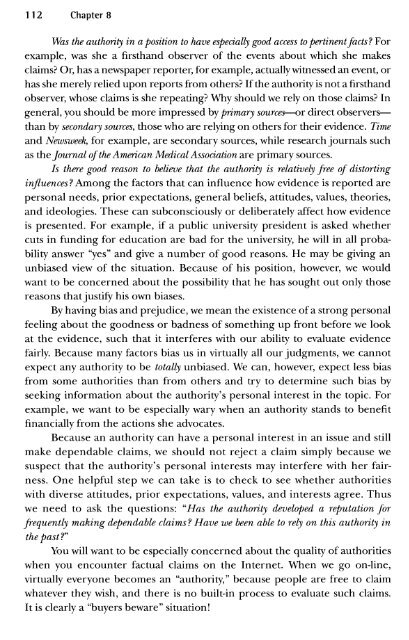Asking the Right Questions, A Guide to Critical Thinking, 8th Ed
Asking the Right Questions, A Guide to Critical Thinking, 8th Ed
Asking the Right Questions, A Guide to Critical Thinking, 8th Ed
Create successful ePaper yourself
Turn your PDF publications into a flip-book with our unique Google optimized e-Paper software.
112 Chapter 8<br />
Was <strong>the</strong> authority in a position <strong>to</strong> have especially good access <strong>to</strong> pertinent fact<br />
example, was she a firsthand observer of <strong>the</strong> events about which she makes<br />
claims? Or, has a newspaper reporter, for example, actually witnessed an event, or<br />
has she merely relied upon reports from o<strong>the</strong>rs? If <strong>the</strong> authority is not a firsthand<br />
observer, whose claims is she repeating? Why should we rely on those claims? In<br />
general, you should be more impressed by primary sources—or direct observers—<br />
than by secondary sources, those who are relying on o<strong>the</strong>rs for <strong>the</strong>ir evidence. Time<br />
and Newsweek, for example, are secondary sources, while research journals such<br />
as <strong>the</strong> Journal of <strong>the</strong> American Medical Association are primary sources.<br />
Is <strong>the</strong>re good reason <strong>to</strong> believe that <strong>the</strong> authority is relatively free of dis<strong>to</strong>rtin<br />
influences? Among <strong>the</strong> fac<strong>to</strong>rs that can influence how evidence is reported are<br />
personal needs, prior expectations, general beliefs, attitudes, values, <strong>the</strong>ories,<br />
and ideologies. These can subconsciously or deliberately affect how evidence<br />
is presented. For example, if a public university president is asked whe<strong>the</strong>r<br />
cuts in funding for education are bad for <strong>the</strong> university, he will in all probability<br />
answer "yes" and give a number of good reasons. He may be giving an<br />
unbiased view of <strong>the</strong> situation. Because of his position, however, we would<br />
want <strong>to</strong> be concerned about <strong>the</strong> possibility that he has sought out only those<br />
reasons that justify his own biases.<br />
By having bias and prejudice, we mean <strong>the</strong> existence of a strong personal<br />
feeling about <strong>the</strong> goodness or badness of something up front before we look<br />
at <strong>the</strong> evidence, such that it interferes with our ability <strong>to</strong> evaluate evidence<br />
fairly. Because many fac<strong>to</strong>rs bias us in virtually all our judgments, we cannot<br />
expect any authority <strong>to</strong> be <strong>to</strong>tally unbiased. We can, however, expect less bias<br />
from some authorities than from o<strong>the</strong>rs and try <strong>to</strong> determine such bias by<br />
seeking information about <strong>the</strong> authority's personal interest in <strong>the</strong> <strong>to</strong>pic. For<br />
example, we want <strong>to</strong> be especially wary when an authority stands <strong>to</strong> benefit<br />
financially from <strong>the</strong> actions she advocates.<br />
Because an authority can have a personal interest in an issue and still<br />
make dependable claims, we should not reject a claim simply because we<br />
suspect that <strong>the</strong> authority's personal interests may interfere with her fairness.<br />
One helpful step we can take is <strong>to</strong> check <strong>to</strong> see whe<strong>the</strong>r authorities<br />
with diverse attitudes, prior expectations, values, and interests agree. Thus<br />
we need <strong>to</strong> ask <strong>the</strong> questions: "Has <strong>the</strong> authority developed a reputation for<br />
frequently making dependable claims ? Have we been able <strong>to</strong> rely on this authority<br />
<strong>the</strong> past ?"<br />
You will want <strong>to</strong> be especially concerned about <strong>the</strong> quality of authorities<br />
when you encounter factual claims on <strong>the</strong> Internet. When we go on-line,<br />
virtually everyone becomes an "authority," because people are free <strong>to</strong> claim<br />
whatever <strong>the</strong>y wish, and <strong>the</strong>re is no built-in process <strong>to</strong> evaluate such claims.<br />
It is clearly a "buyers beware" situation!



